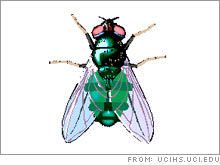 |
| Blowfly larvae, otherwise known as maggots, are used to clean wounds. |
|
|
|
NEW YORK (CNN/Money) -
Unclassified maggot, your days are numbered.
Maggots, which are used in some medical procedures to clean wounds, and leeches, which are used to draw blood during skin grafts, are regulated by the Food and Drug Administration. But they have managed to avoid the agency 's medical product classification, which can be stringent and costly.
This will change on Thursday and Friday, when an FDA advisory panel will decide how to classify maggots, leeches and other medical devices, including bone wax, tissue expanders and wound dressing that contains drugs.
Medical maggots are supplied by the University of California, and the French firm Ricarimpex has been breeding leaches since 1845. Johnson & Johnson (up $0.08 to $62.84, Research) and other companies make bone wax, a coating that prevents bone bleeding and has been in use since the 19th century, as well as the wound dressings that contain healing drugs. Tissue expanders are produced by companies like Mentor Corp. (up $1.00 to $53.27, Research) and Inamed Corp. (up $0.11 to $73.57, Research) to create pockets for breast implants.
These products are regulated by the FDA but have never been classified, which means the companies and institutions that produce them don't have to file new product applications with the FDA, which can costs hundreds of thousands of dollars and take months to go through the process. Sometimes, that process ends in rejection.
"These were overlooked when they tried to classify all medical devices [in 1976,]" said David Krause, executive director of the FDA's advisory panel that handles these medical devices. "We think these are the last ones."
Medical devices are classified as 1, 2, or 3, with the highest number requiring the most stringent oversight. Relatively simple devices like gauze pads are class 1 and do not require an FDA submission, said Krause. Sutures, stents and surgical mesh used to hold soft tissue following hernias are class 2, which typically requires a 90-day review by the FDA. Breast implants are class 3, requiring a submission that costs hundreds of thousands of dollars and a review process of approximately six months.
The advisory panel will vote on the product classification and the FDA will make a decision, probably within a year, said Krause. Then, companies will be required to submit product applications, even if their products are already on the market. The products would not be taken off the market unless they miss their deadlines or the FDA rejects the applications, but this won't happen for at least two years from now, Krause said.
The companies and institutions are invited to present data to the advisory committees, but Krause said there are no takers so far.
"They have not contacted me," said Krause.

|